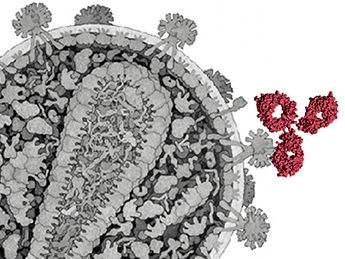New Study Indicates Smallpox Vaccination Effective for Decades
Implications for Vaccine Distribution in Event of Bioterrorist Attack
Although naturally occurring smallpox was eradicated in 1977, there is concern that bioterrorists might obtain smallpox from a laboratory and release it into the population. Under such circumstances, the supply of smallpox vaccine may be insufficient for universal administration. In a study published in the December 2008 issue of The American Journal of medicine, researchers found that lifetime protection is obtained from just one vaccination, even when that vaccination occurred as much as 88 years ago. They conclude that in the event of a smallpox bioterrorist attack, vaccinia smallpox vaccine should be used first on individuals who have not been vaccinated previously.
Examining 246 participants of the Baltimore Longitudinal Study of Aging, investigators from the National Institute on Aging and the National Institute of Allergy and Infectious Diseases, National Institutes of Health found permanent immunity was conferred by vaccination or by survival from an active smallpox infection. In the sample, 209 subjects were vaccinated one or more times 13 to 88 years prior to the study; an additional 18 had had childhood smallpox, and 29 with no history of vaccination or smallpox were included.
Although the vaccinia virus vaccine was used since the late 18th century, routine vaccination was discontinued more than 30 years ago in many countries. Most Americans under 35 have never been vaccinated and most over 35 have not received booster immunizations since the early 1970s. If a bioterrorist attack were to occur, it would be critical to know who already had effective immunity and would not need to be vaccinated, leaving another dose available for someone else.
Current recommendations relating to smallpox vaccination has been that people with repeated exposure to smallpox, for example travelers to endemic areas, should be revaccinated every five years. This study suggests that such reimmunizations may not be necessary because multiple vaccinations achieve only marginally higher levels of antibody and virus neutralizing activity than single vaccination.
Writing in the article, Dan L. Longo, MD, National Institute on Aging, states “A major question posed today is whether those individuals vaccinated 40 or more years ago would be protected in the event of smallpox exposure. This may be a critical question because the availability of smallpox vaccines is limited and currently inadequate for a mass inoculation program. We found that vaccinated subjects maintain what appear to be protective levels of neutralizing antibodies to vaccinia indefinitely and do not require booster vaccinations even if they are many decades removed from primary vaccination. These data imply that limited supplies of vaccine can be more usefully applied to individuals who have never been vaccinated, primarily individuals born after 1972.”
Original publication: Dennis D. Taub, William B. Ershler, Mark Janowski, Andrew Artz, Michael L. Key, Julie McKelvey, Denis Muller, Bernard Moss, Luigi Ferrucci, Patricia L. Duffey and Dan L. Longo; “Immunity from Smallpox Vaccine Persists for Decades: A Longitudinal Study”; The American Journal of Medicine 2008, Volume 121, Issue 12 (December 2008).
Other news from the department science
Most read news
More news from our other portals
See the theme worlds for related content
Topic world Antibodies
Antibodies are specialized molecules of our immune system that can specifically recognize and neutralize pathogens or foreign substances. Antibody research in biotech and pharma has recognized this natural defense potential and is working intensively to make it therapeutically useful. From monoclonal antibodies used against cancer or autoimmune diseases to antibody-drug conjugates that specifically transport drugs to disease cells - the possibilities are enormous

Topic world Antibodies
Antibodies are specialized molecules of our immune system that can specifically recognize and neutralize pathogens or foreign substances. Antibody research in biotech and pharma has recognized this natural defense potential and is working intensively to make it therapeutically useful. From monoclonal antibodies used against cancer or autoimmune diseases to antibody-drug conjugates that specifically transport drugs to disease cells - the possibilities are enormous























































